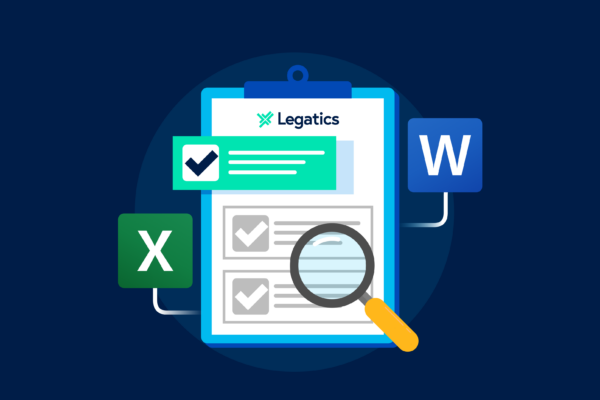Real estate transactions are complex, document-heavy, and long-running. They present significant challenges for the attorneys working on them. Despite this, little has changed in how these transactions are managed. Attorneys often carry out due diligence on the same volume of paperwork and perform the same manual administrative tasks using tools that haven’t evolved much over the past decade.
In this article, we discuss how legaltech can challenge the status quo—equipping attorneys with tools capable of handling the demands of these transactions.
1) Large Volume of Documents
These transactions typically involve an overwhelming number of documents. Managing this volume and addressing the associated queries is a monumental task.
2) Complex Due Diligence
Attorneys must conduct thorough due diligence for real estate transactions. This process is both in-depth and essential to the success and legality of any real estate deal. It requires careful examination of areas such as contractual obligations, property titles, and other legal intricacies. Collaboration with professionals from construction, taxation, planning, and property management is often necessary to gather all required information.
3) Enquiries on Title
The enquiries on title process involves extensive back-and-forth between buyers and sellers to address any questions that might affect the purchase. Documenting these inquiries can be time-consuming and prone to human error.
4) Financing and Mortgages
Real estate transactions often involve financing, where buyers require funding to acquire the property. Managing the conditions precedent (CP) process—often comprising hundreds of CPs—requires coordination among multiple parties and teams, including banking, taxation, planning, real estate, and construction professionals, as well as third parties like lenders, property managers, and subcontractors.
5) Complex Closing Process
Due to the many parties involved, the closing process in real estate transactions is intricate and demands significant effort to prepare and review all necessary documents.
How do lawyers manage real estate transactions?
Despite the many advances in legaltech in recent years, many lawyers are still using tools like Word, Excel – and even Outlook reminders – to manage their real estate transactions. In fact, a survey originally undertaken by Epinion found that 68% of attorneys and auditors viewed Word as critically important to their work, with 56% spending over three hours a day using it.
Some law firms also use data room software to store and share real estate documents. These platforms allow bulk uploads and provide a secure space for organizing files. However, data rooms are not without risks. Missed email notifications for new file uploads can lead to version control issues and overlooked documents. They also lack tools for managing the status of document reviews.
Using Word and Excel for tasks like creating lists or managing enquiries on title is inefficient, time-consuming, and increases the risk of human error.
Using Word and Excel to run your transactions is like using a typewriter in the age of AI.
How does legaltech improve the management of real estate transactions?
Transaction management software can do a number of things that Word and Excel can’t! Using a platform like Legatics to create and manage lists, for example, saves lawyers a significant amount of time and creates a single source of truth – reducing version control issues and the risk of documents being misfiled or misplaced.
Lists in Legatics are fully customizable, with specialized columns you can resize, rename, and reorder with ease. The platform also has a full audit trail to log every action taken, advanced permissions so you can set who has access to what information, and automatic notifications to alert parties of actions assigned to them.
As real estate transactions rely on coordinating and communicating with multiple parties, like surveyors, architects, technical experts, and lenders, having a central platform to store all of the relevant information is invaluable. This significantly improves convenience and collaboration – with features like notifications for assigned tasks enhancing this further and reducing manual admin.
It also greatly streamlines the management of queries, with them being visible within the platform rather than hidden in email chains. On top of this, parties can see at a glance how their deal is progressing.
‘Enquiries on title’ use case
Let’s take the ‘enquiries on title’ process as an example use case. Lawyers typically manage this process using an Excel spreadsheet, with the seller’s side logging their queries in a column and additional columns being added to manage the responses from the buyer’s side or to include any associated files or links to relevant information.
The correspondence concerning the queries is generally emailed back and forth, then copied into the spreadsheet to record their progress. This is not only time-consuming, but it is also subject to risk – with responses being missed or copied into the wrong place in the spreadsheet.
Using Legatics to manage this process simplifies it significantly and offers the following benefits:

What can legaltech do for you?
Legaltech has the potential to significantly improve the management of real estate transactions, particularly due to their complex, long-running, and multi-party nature. The technology exists, so why continue to struggle with tools that are decades old and simply not fit for purpose?
Switching to a platform like Legatics also upholds a secure environment that maintains confidentiality and minimizes data and security risks. The platform intuitively reflects the way in which lawyers run their transactions, to facilitate easy onboarding and adoption. For the lawyer, Legatics can significantly reduce time spent on non-billable work – freeing up time for more fulfilling, strategic work that matters most to their clients.
For more information about how Legatics can transform your real estate transaction management, book a demo with our knowledgeable team!









